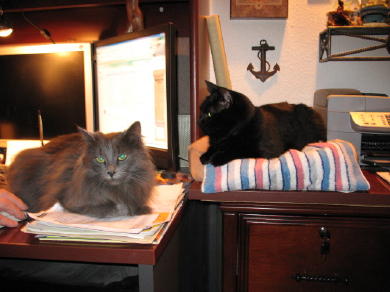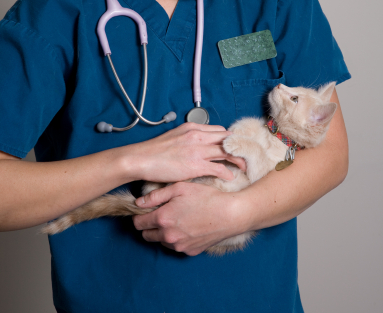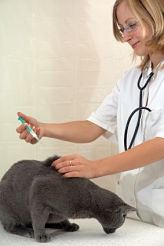Feline Infectious Peritonitis

Feline infectious peritonitis is mainly a disease of multi-cat households and catteries where the death rate is approximately 95%. This disease afflicts all cat breeds but some pure-breeds are particularly susceptible. Cats ranging from several weeks to young adults are most commonly affected but an aged cat can develop feline infectious peritonitis as well.
It is probably the most common cause of unexplained fevers in cats. A cat not responding to antibiotics is likely infected and other signs are weight loss, lethargy, eye disease and swelling of the abdomen.
Scientists, over many years, have been able to classify numerous related viruses into groups such as FECV (feline enteric corona-viruses) that infect the intestinal tract and FIPV's (feline infectious peritonitis viruses) that are responsible for the mutated virus that is feline infectious peritonitis.
Some veterinarians believe that stressful situations may make a cat more likely to develop feline infectious peritonitis. Weaning, neutering, entering a new home, kenneling and concurrent diseases are some of the stresses. Add overcrowding and poor sanitation to the mix and the risk increases.
To understand the transmission of FIP or feline infections peritonitis, one must know how FECV's are spread. FECV's , although contagious, cause a mild, self-limiting disease and are spread from cat to cat by ingestion of the virus. The virus replicates in the intestinal tract where it's eventually shed in the feces. Infectious virus particles in the feces then spread the virus to other cats...such as those sharing a litter box. The virus can be passed by mutual grooming and sharing a water bowl or food dish.
There are no definite clinical signs of FIP because so many can be caused by other diseases. However, feline infectious peritonitis usually results in one of two different manifestations; the wet form or the dry form. The wet form is an effusion and accumulation of a high protein fluid into various body cavities. This high protein fluid is most often seen in the abdominal cavity but can also be found in the chest cavity and pericardial sac (a sac formed by a thin tissue surrounding the heart).
The dry form is characterized by a specific type of inflammation called pyogranulomatous inflammation ( a collection of certain types of inflammatory cells and white blood cells). This inflammation is seen in and on the surface of the abdominal organs (liver, kidneys and intestines), the lungs and the central nervous system.
Clinical signs of the wet form usually reflect fluid accumulation. Alternatively, signs may be referable to the organs damaged by pyogranulomatous inflammation. If the inflammation is primarily affecting the kidneys, the cat may have signs of kidney disease (increased urination, dehydration, and decreased appetite, as well as blood work showing elevations in the kidney parameters).
Affected cats are usually lethargic and anorexic, although they occasionally remain bright and have a normal appetite, at least in the early stages. Signs can range from minimal to severe incapacitation. Abdominal distension, weight loss, fevers, difficulty breathing, ocular problems, and neurological signs (seizures, difficulty walking, in-coordination, and behavior changes) are common.
Feline infectious peritonitis (FIP) is one of the most difficult diseases to diagnose. Blood tests uncover nonspecific findings. Complete blood counts (CBC) usually reveal anemia ( decreased red blood cell count) and increases in white blood cell counts (WBC). Other findings can include increased liver enzymes ( indicating liver problems), increased kidney values (which indicate kidney disease), and increased blood protein, specifically the protein content comprised of globulins.
Globulin levels mainly reflect the antibodies and their activity originating within the immune system. There are other tests like testing for the DNA to establish the presence of the gene but it hasn't been shown that these sophisticated tests are 100% accurate.
Sadly, no specific treatments for the feline infectious peritonitis (FIP) exist. Eventually cats infected with FIP succumb to the disease or are humanely euthanized. Over many years there have been experimental therapies that have been tried without success and there have been drugs to boost the immune system that have had trials and have also failed to eliminate the virus. Cats with minimal clinical signs can be treated with supportive measures, such as intravenous or subcutaneous fluids, antibiotics, and sometimes anti-inflammatory drugs, to improve their quality of life.
Without a successful treatment, prevention is the only way to control, FIP. Strict sanitation appears to be a major factor in preventing the spread of this virus, so isolating kittens from adults in catteries helps. A good disinfectant kills the virus. There have been efforts to make a safe and effective vaccine but the one by Pfizer, the only one available, is controversial.
Studies done at Cornell University with the vaccine show that it is not very effective and that it may even sensitize some cats to the disease. It is unlikely that an indoor house-cat will be exposed to the disease, so trying an "iffy" vaccine doesn't make much sense.
In the final analysis, the best prevention is keeping your cats indoors so they don't encounter FIP in the first place
Related Articles......
Return from Feline Infectious Peritonitis to Cat Health Homepage
Having trouble finding what you need? Cat Health Index & Site Map
OR
Do you have a question to ask?...Questions
OR
Do you have a cat story to share?...Simply click here to go to that page!
Copyright@2010-2020 All rights reserved.Cat-health-detective.com
This website is information only. Consult a veterinarian for medical assistance

"Like Us" on Facebook
or...
"Like Us" here




















